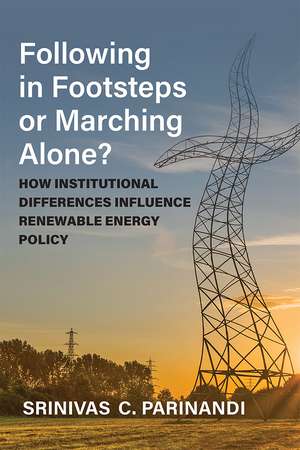Following in Footsteps or Marching Alone?: How Institutional Differences Influence Renewable Energy Policy
Autor Srinivas Parinandien Limba Engleză Paperback – 21 feb 2023
In Following in Footsteps or Marching Alone?, Srinivas Parinandi explores how states have devised their own novel policies, and how the political workings of legislatures and public utilities commissions have impacted state renewable energy policy design. Through the meticulous study of nearly three decades of state-level renewable energy policy-making, he finds that their creation is primarily driven by legislatures, and that ideologically liberal legislatures largely push the envelope. The book suggests that having a predominantly state-driven renewable energy effort can lead to uneven and patchwork-based policy development outcomes, and a possible solution is to try to more successfully federalize these issues. Parinandi urges readers, scholars, and policy practitioners to consider whether a state-led effort is adequate enough to handle the task of building momentum for renewable energy in one of the world’s largest electricity markets.
Preț: 171.98 lei
Nou
Puncte Express: 258
Preț estimativ în valută:
32.91€ • 34.61$ • 27.19£
32.91€ • 34.61$ • 27.19£
Carte indisponibilă temporar
Doresc să fiu notificat când acest titlu va fi disponibil:
Se trimite...
Preluare comenzi: 021 569.72.76
Specificații
ISBN-13: 9780472055821
ISBN-10: 0472055828
Pagini: 296
Ilustrații: 11 figures, 26 tables
Dimensiuni: 152 x 229 x 20 mm
Greutate: 0.4 kg
Editura: UNIVERSITY OF MICHIGAN PRESS
Colecția University of Michigan Press
ISBN-10: 0472055828
Pagini: 296
Ilustrații: 11 figures, 26 tables
Dimensiuni: 152 x 229 x 20 mm
Greutate: 0.4 kg
Editura: UNIVERSITY OF MICHIGAN PRESS
Colecția University of Michigan Press
Notă biografică
Srinivas Parinandi is Assistant Professor in Political Science at the University of Colorado at Boulder.
Cuprins
List of Tables
List of Figures
List of Lists
Acknowledgments
I. Introduction:
II. Renewable Portfolio Standards in the U.S. States
III. Identifying Invention in State Sub-Policy
IV. Situating Legislative and Regulatory RPS Invention in Broader Context
V. Liberal Ideology and Legislative Invention in Renewable Energy Policy
VI. Regulatory Invention: A Case for Disruption
VII. Case Studies of Legislative and Regulatory RPS Invention
VIII. Extending the Legislative Analysis to Anti-Abortion Policy
IX. Conclusion
Appendix
References
List of Figures
List of Lists
Acknowledgments
I. Introduction:
II. Renewable Portfolio Standards in the U.S. States
III. Identifying Invention in State Sub-Policy
IV. Situating Legislative and Regulatory RPS Invention in Broader Context
V. Liberal Ideology and Legislative Invention in Renewable Energy Policy
VI. Regulatory Invention: A Case for Disruption
VII. Case Studies of Legislative and Regulatory RPS Invention
VIII. Extending the Legislative Analysis to Anti-Abortion Policy
IX. Conclusion
Appendix
References
Recenzii
“This book poses a new question in the innovation literature—what predicts invention rather than borrowing—and provides a rigorous test in the important policy realm of renewable energy policy standards. It makes strong contributions to the literature on state politics, on environmental politics, and on policy innovation.”
—Thad Kousser, University of California, San Diego
—Thad Kousser, University of California, San Diego
“This innovative and exciting book makes a significant intellectual contribution to the study of policy diffusion among the American states. It is engaging, accessible, and extraordinarily compelling.”
—Andrew Karch, University of Minnesota
—Andrew Karch, University of Minnesota
Descriere
Renewable energy policies and the politics of resource management
